TV Work - Stephen Leather
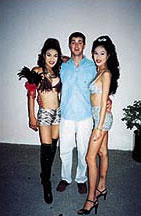
Actor Danny Brown with two ‘ladyboys’ celebrating the end of filming my episodes of The Knock in Thailand
My first television work came from my association with producer Paul Knight. Paul has produced a host of top TV shows, including Black Beauty, Robin of Sherwood, London’s Burning and The Knock and is a living legend in the business. He bought the TV rights to my first big book, The Chinaman, but despite pushing the project hard it didn’t get made. Paul offered me the chance to write three episodes of his Customs and Excise series, The Knock, and I had great fun doing it, especially as he let me set part of it in Thailand.
My episodes featured a great female villain played by Cheri Lunghi (famous for her Kenco coffee ads) and her sidekick played by Murray Head. It was great having Murray on board, especially as he played a drugs courier bringing heroin back from Thailand. Murray is famous for singing “One Night In Bangkok” which is played all the time in the city’s go-go bars, and it was surreal wandering around bars with him as the song was being played.
While I was working on The Knock, I decided to write a drama about a housewife who has to take over her husband’s criminal empire when he is sent to prison for murder. After I’d produced a first draft of The Stretch, Paul and I approached former Eastenders star Anita Dobson to see if she’d be interested in playing the lead character, Samantha Greene. She loved the story and immediately said she’d do it. Paul and I then had the idea of using Leslie Grantham in the show, and I reworked the story to give him a major role.
When Leslie read it, he was keen to do it, which was great news because it was the first time Anita and he had worked together since leaving the popular soap.
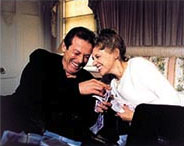
Leslie Grantham and Anita Dobson starring in The Stretch, shown on Sky One.
The Stretch was great fun, but it was a tough shoot as Anita was also appearing in The Pyjama Game in the West End so everything was a rush. She and Leslie gave great performances, though, and we spent a few days filming in Spain. Anita’s partner, Brian May of Queen, did the music. It came out on VHS video but never made it to DVD and sadly now seems to have vanished.
Working in television can be great fun, but it has its disadvantages, too. Writing books can be a lonely process, but at least you have effective control of the plot, the characters, and the dialogue. Any editing is done once the book is finished, and every book editor I’ve ever had has been diligent, hard-working and supportive.
Television is much more of a collective process, which is fine so long as you are dealing with people who know what they’re doing. The snag is, the British television industry has become a haven for very untalented people who want to work in a creative industry. They can be a nightmare to work with. They want to have input into the creative process but generally don’t have the talent. They do however have the power and control over the money. In my experience, generally, the smaller the company, the more fun they are to work with. The bigger the company gets, the more dead wood it acquires.
Shortly after I wrote The Knock, I went to see the people who produce The Bill, a long-running police drama. I’d always enjoyed the show and wanted to write an episode. I had a good meeting with a young script editor and promised to send her a few ideas. What followed was just plain weird and not an experience I ever want to repeat. I gave her twenty ideas, many of which she liked. But she then said she wanted to write an episode based on an idea she’d had. I said it would make more sense to write an episode of my own, and it was clear I’d offended her.
Things went from bad to worse. The Bill had a set formula for producing scripts – first the writer produces a very short synopsis, just a few paragraphs, of what the story is about. If the synopsis is approved at a script meeting attended by the show’s script editors and producers, the writer produces a detailed treatment. The treatment then goes before the group, and only if it’s approved does the writer get the go ahead to write the full script. My script editor insisted on long rambling telephone talks where she paced up and down wearing a headset, and practically dictated the synopsis to me. It was approved. I then wrote a treatment, which she insisted on me rewriting three or four times. It was approved. Then I wrote the script. I thought it was just about okay, considering how much she insisted on changing, but she then gave it to one of the show’s police advisors who insisted on more changes. Then she made even more changes of her own. What we ended up with was a dog’s breakfast of a script – which she loved.
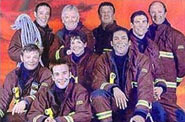
The boys, and girl, of Blue Watch in London’s Burning.
It went to the next script meeting, and everyone hated it. The script editor managed to duck the flack, blamed me, and I was told never to darken their doorstep again. I often used to see the girl’s name on the end credits of episodes of The Bill, and I used to wonder if she was still treating writers the way she treated me. My mistake was not asking for a new script editor as soon as I realized that we weren’t getting on.
The Bill wasn’t my only unpleasant experience! While The Stretch was in production, I wrote two episodes of London’s Burning for London Weekend Television, who have been producing the long-running firemen drama since Paul Knight left the show.
I wrote two episodes, directed by the excellent Phillipa Langdale and edited by my good mate Nigel Parkes, who also edited my episodes of The Knock and the TV version of my book The Bombmaker. I’ve always loved the show, but writing for them was on a par with my experience on The Bill – young script editors wanting to meddle, every man and his dog wanting to stick their oar in. This time I stood my ground and had many a pitched battle with the meddlers (one of them quit in tears), and we ended up with a double episode that got rave reviews, but I wasn’t asked back to do more. Like The Bill, London’s Burning was eventually cancelled.
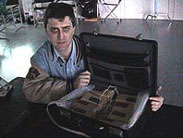
Me on the set of The Bombmaker with a briefcase full of Semtex
Once we’d finishing filming The Stretch, Sky were keen for Paul and I do something else for them. They read my book The Bombmaker and asked if we’d do it as a two- parter. We jumped at the chance. It was a relatively easy script to write because I was so familiar with all the characters. The hardest part was cutting out all the sub-plots and reducing the number of characters so that everything would fit into two 72-minute episodes.
Sky loved the scripts and rushed it into production. Dervla Kirwan (Ballykissangel) was signed up to play Andrea Hayes, the retired IRA bombmaker whose past life comes back to haunt her when her seven-year-old daughter is kidnapped. Her husband is played by Mark Womack (Liverpool One) and Samantha Bond (various James Bond films) plays Patsy, the MI5 agent who has to prevent a major terrorist incident. Filming started in October 2000 and the show was shown several times throughout 2001. It also never went to DVD and hasn’t appeared on any of the streaming sites, which is a pity as it was a good movie.
While he was producing The Bombmaker, Paul was also developing a series for BBC1 with another writer, Anthony Horovitz (Crime Traveller, Midsomer Murders). The series, called Murder In Mind, featured a different murder each week, following the story from the murderer’s point of view. The technique was used in the old Columbo series, where the viewer gets to see the murder up front and the mystery is how the murderer gets his comeuppance. Murder In Mind doesn’t have a detective in a raincoat, each week different policemen get to investigate the crime.
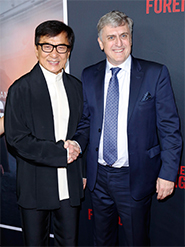
Me and Jackie Chan at the Premier of The Foreigner
Paul asked me to write an episode and I wrote one called Fireman, about a fireman who hires a professional killer to kill his wife and her lover. It starred Steve Macfadden, who plays Phil Mitchell in the long-running Eastenders soap. The fireman finds the assassin on the Internet (played by the excellent Keith Allen) but he’s more than an assassin, he’s a serial killer who isn’t killing for the money.
I then wrote a second episode for the first series about a group of vigilantes who accidentally kill a suspected paedophile, only to discover that he was an innocent bystander. To make matters more complicated, one of the vigilantes is a policeman who gets called in to investigate the crime.
I went on to write two more episodes for the second series of Murder In Mind. You can still buy the DVDs on Amazon. It was a terrific series and it was a pity that the BBC didn’t continue with it.
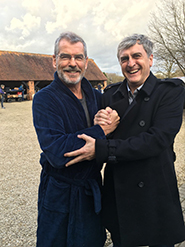
Me and Pierce Brosnan on the set of The Foreigner
One of my books, The Chinaman, was turned into a feature film starring Jackie Chan and Pierce Brosnan. directed by Martin Campbell. The script was written by a Hollywood screenwriter but the plot stayed very close to my book. The producers felt that The Chinaman wasn’t PC (even though it was always meant ironically) so they changed it to The Foreigner. The movie grossed $140 million worldwide and got great reviews. I had my fingers crossed for a sequel but it doesn’t look as if it will happen.
Another of my books, Tango One, was also turned into a feature film, starring Vincent Regan. It was made by Universal on a very very low budget and went straight to DVD. It’s not bad, but I do wish it had been a bigger film.
I found it fairly easy to get into television writing, but I had the advantage of being a published writer. The more I’ve worked in the industry, the more it’s become clear to me that often it really is a case of who you know rather than the quality of your work.
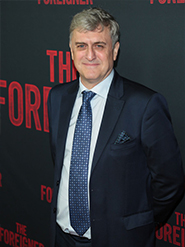
Me at the Premier of The Foreigner
Books are different, I always say that if your book is good, it’ll be recognized as good eventually and will be published. With television, it’s a question of getting the right person to read your work and that can be hard to do unless you’ve got the right contacts. Sending original scripts on spec to the BBC or the ITV companies rarely works.
One of the best examples is John Sullivan (Citizen Smith, Only Fools and Horses, Dear John, Roger Roger) who spent ages trying to get anyone interested in his work. He finally cracked it by getting a job shifting scenery for the BBC and approaching executives in the BBC bar after work.
You’d think having an agent would make things easier, but I’m afraid that so far as working in television is concerned, that’s not necessarily so. I’ve a pretty low opinion of agents in general, but television agents seem to be the worst of a bad bunch. I’ve yet to meet one who I’d consider half-way intelligent, and to a man they’ve been lazy and unimaginative. I don’t know a single writer who thinks he has a good agent, and I’ve never met a writer who’s told me that their agent has found them work. One agent who represented me (yet never fixed up a single meeting or writing assignment) seemed to be in Groucho’s Club more often than he was in his office.
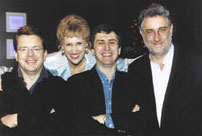
The team behind The Stretch: James Baker of Sky, actress Anita Dobson, the author, producer Paul Knight.
Agents are so lazy that unless you’ve got a proven track record they are unlikely to take you on. They’re generally not interested in breaking new talent, it’s far more profitable for them to increase their stable of already-producing writers and take fifteen per cent from them. Take a look at the website of a big agency such as Peters Fraser and Dunlop and see how many writers each agent has. Dozens. Which means they have hardly any time to devote to looking for work for their clients.
I was at a point in my career when I was between agents, and I went to see an agent at a relatively large London firm to see if she’d be interested in representing me. I explained that I had almost a dozen books in print but that I needed an agent who could get me television work. You could see the look of horror on her face – the idea of an agent actually drumming up work wasn’t something she could cope with and she didn’t take me on!
I asked another agent to fix me up with meetings with producers of existing shows, just so I could get a foot in the door to pitch story ideas. Over six months he wasn’t able to arrange a single meeting. Yet that same agent took almost £30,000 from me over two years for work that I had fixed up myself. That was twenty years ago and sadly if anything the situation has got worse.
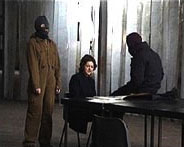
Dervla Kirwan (centre) during the filming of The Bombmaker
I’m not saying you shouldn’t try to get an agent - you should. But don’t hold your breath waiting for them to get you writing assignments, because that’s not what they do. They have lunch, they go to their villas in Tuscany, and they sit with their heads up their backsides (I know, that’s physically impossible, but you get my drift).
Agents aside, it’s important to remember that things that come easily are rarely worth having. There are steps you can take to give yourself an edge over the rest of the thousands of writers trying to break into television.
First, learn the craft. Unlike writing novels, television writing has a set of very definite rules, in terms of presentation and construction, and they have to be learned. Go on courses, read books, join writing groups if you can.
Once you are producing work that you’re happy with, try sending it to agents - you can get names and addresses from The Writers and Artists Yearbook. You might strike lucky, but don’t be disheartened if they don’t reply. And if you do get an agent and they don’t perform, don’t be afraid of sacking them. That goes for book agents, too.
Another way in is to approach independent producers, the companies which produce television programmes for ITV, BBC and the cable, satellite and online channels. Many are listed in The Writers and Artists Yearbook and you’ll see their names at the end of shows. The best way to introduce yourself is to send a sample of your work and a covering letter. With any luck they’ll ask you in for a chat.
The thing to remember is that as a rule independent producers don’t have money to invest in projects. They take projects to the various broadcasting companies and try to persuade them to part with cash. They might be interested in your ideas and want to work with you, but generally you have to do much of your work up front without any guarantee of payment. I have half a dozen television projects in which I’ve invested many hundreds of hours for no money and which will probably never see the light of day. It might not be fair, but that’s the way it is.

"Script editors can be a nightmare to work with"
If an independent producer likes you and wants to work with you, they’ll probably offer to help you develop an idea and work on a script together. You’ll get input and support and probably the occasional lunch, but you almost certainly won’t get any money until they manage to get a development deal with a broadcaster. It’s a question of persevering and learning. And you don’t have to work with just one producer – you could have several projects in various stages of development with different producers. The more the merrier.
Another way in to the business is to try to catch the eye of a producer or script editor on an established show that uses a stable of writers. To do that, you’ll have to write a ‘spec’ script for the show to show that you’ve got what it takes. They almost certainly won’t buy it but if it’s any good they’ll invite you in for a chat.
Many long-running shows have dozens of writers and are always looking for new talent. They have script editors who work closely with writers developing plots and writing scripts, and they have a stack of information on the show and its characters - ‘the bible’ that all writers have to work from. Once you have a few episodes of an existing show under your belt, you’ll find it easier to get broadcasters to listen to your own ideas for your own show.
Make sure you really have watched any show that you offer to write for – you have to know what’s already been shown and who all the characters are. You have to say you’re a fan of the show, even if you aren’t. One tip is to find an episode you really like and look at the credits at the end – find out who the script editor was and write to them personally, tell them what a great show it was and how much you’d like to work with them. Flattery rarely fails. If nothing else they’ll ask you in for a chat so that you can flatter them even more! But don’t get me wrong – it’s a notoriously difficult business to break into.





Final Draft
Anyone serious about writing screenplays has to have a screenwriting program. Using a standard word-processing program such as Word will mark you out as an amateur. I’ve used most of the screenwriting programs, and in my opinion Final Draft is the best. I’ve written scripts for The Knock, London’s Burning and Murder In Mind with Final Draft and it has paid for itself a thousand times over. The BBC uses it, as do most ITV companies and independents. Final Draft makes your screenplay look professional, but it also takes a lot of the work out of the writing. It remembers all your settings and your characters, and it automatically puts scene settings, action, dialogue and instructions in the right format. You can also assign voices to your characters and have your computer read the script out to you. Using Final Draft means that I can e-mail my scripts to the BBC production offices, which is also a great time-saver.

Character Pro Version 4
Drama is all about character, and one of the hardest things about writing is to create characters. I’ve written more than eighteen novels and probably twenty hours of screenplays, and in the course of that have created literally hundreds of different characters. One of the skills of being a writer is to put yourself in the heads of your characters, and this product helps you to do just that. It’s a good tool for a first-timer looking to create characters, but it’s also a Godsend for writers like me who’ve created hundreds of characters and are running out of ideas!

Dreamascript
At just under £200, there’s no way of getting away from the fact that this is an expensive product, but it does have a stack of features that can help you write and sell your screenplay. It functions almost as a co-writer, encouraging you, advising you, helping you develop plot and characters. You can also submit your work for a free review by an experienced script reader. Most writers work alone, and if you don’t have close friends or family to offer encouragement and advice, then this is a great alternative.
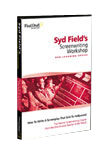
Syd Field Screenwriting Workshop DVD
Syd Field is a legendary name in the screenplay business. For more than a quarter of century he has been teaching professional and amateur screenwriters in the States, some of whom have gone on to be among the biggest names in Hollywood. Not everyone can go to the States to attend one of his writing courses, but you can benefit from the master’s experience on this DVD. It’s an invaluable tool and a great introduction to anyone planning to write for the screen.

Writers and Artists Yearbook
Recommended by The Writers’ Guild, the Writers and Artists Yearbook is the definitive guide to the world of publishing. It’s got full lists of all UK and US publishing houses, lists of agents on both sides of the Atlantic, plus details of newspapers, radio and TV stations. It’s more than a book of lists though, it has feature articles, at least one of which is usually by a famous author who claims that the Writers and Artists Yearbook was a key element of their success. There’s also advice on self-publishing and vanity publishing, creative writing courses, advice on preparing and submitting manuscripts, and advice on copyright, libel and tax.

Writing For Television By Gerald Kelsey
Writing for TV is a craft, and it's a craft that has to be learned. Gerald Kelsey is a former chairman of the Writers' Guild of Great Britain and has written more than 400 scripts, so he knows what he's talking about. His book is one of the excellent Writing Handbooks series, and it's packed with advice on how to write for TV, and how to present and sell your work.

The Screenwriter's Workbook By Syd Field
Syd Field is renowned as the master of the craft of screenwriting and "The Sceenwriter's Handbook" is practically the bible of the film business. He explains why screenplays are structured in the way they are, and argues that understanding the structure is the key to writing a successful script.

Alternative Scriptwriting: Writing Beyond The Rules By Ken Dancyger
At time Dancyger's book reads like a text book, and it sells for a text book price, so it might be worth seeing if your local library has a copy. That said, it can be used as a reference book so it's worth having it on your own shelf. The book doesn't have the chatty style of Syd Field, if anything it has a more academic approach, but whereas Field's book repeats the mantra of structure being everything, Dancyger encourages writers to take risks with structure, character and tone.

Creating Unforgettable Characters By Linda Seger
A useful guide to writing well-developed and rounded characters, which is key to producing a successful novel or screenplay. Seger discusses back stories, supporting characters, how to avoid stereotypes and gives tips on dialogue writing.

Adventures In The Screen Trade By William Goldman
The classic insider's tale of working in Hollywood by the writer of "Butch Cassidy and the Sundance Kid", "All the President's Men" and "Marathon Man". Crammed full of anecdotes and tips, I've yet to meet a screenwriter who hasn't read this book.

WHICH LIE DID I TELL? Or, More Adventures In The Screen Trade By William Goldman
The sequel was seventeen years in the making, but it was worth waiting for. The first half of the book is a chatty, anecdote-filled account of how he wrote films such as The Princes Bride and Year of the Comet. The second half is more of a treatise on writing screenplays, invaluable to any wannabe screenwriter, including a screenplay he wrote for the book which he then allows fellow writers to criticise.





